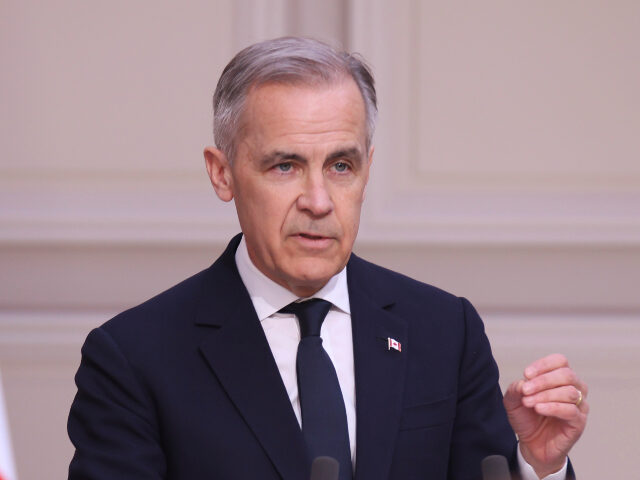Unelected Canadian Prime Minister Mark Carney celebrated the Sikh holiday of Vaisakhi on Sunday in an event in Ottawa for which he donned a turban and helped serve food to attendees.
Some critics, the Times of India reported, observed that Carney marked Vaishakhi on Sunday, despite the holiday taking place on Monday, while disregarding Palm Sunday, which Christians celebrated on April 13.
Carney is currently campaigning for his first elected term as prime minister after succeeding his predecessor Justin Trudeau in March. Carney became prime minister after winning by a landslide the internal race to lead Canada’s left-wing Liberal Party. He assumed the role having never served in public office or run for any political position prior to becoming Canada’s head of government.
At the time Carney assumed the prime ministership – largely as a result of Trudeau’s personal unpopularity – the Liberal Party was facing a double-digit deficit against its top rival, the Conservatives. That lead collapsed as Trudeau faded into obscurity and the Canadian left attempted to identify Conservative Party leader Pierre Poilievre with American President Donald Trump – despite the latter openly expressing a preference for Carney and disparaging Poilievre as acting “stupidly.”
Canada’s Sikh population has increased dramatically in the past two decades, becoming a formidable voting bloc. According to Canada’s statistics agency, the Sikh population of the country increased from 0.9 percent in 2001 to 2.1 percent in 2021, the largest Sikh population of any country outside of India. The growing Sikh population has becoming a point of concern for the Hindu nationalist government of India, which Trudeau accused of trying to assassinate Sikh activists on Canadian soil in 2024, prompting both countries to expel their ambassadors.
Vaisakhi is a holiday marking both the beginning of the spring harvest for Sikhs and the founding of some of the core tenets of the faith. Sikhs use the holiday to celebrate the creation of the Khalsa Panth, an order described as “soldier saints,” by the last living Guru, Guru Gobind Singh, in 1699. On that occasion, the religion also adopted a concept described as the “five Ks,” markers that Sikhs wear at all times: Kesh, or uncut hair; Kanga, a wooden comb worn in the hair; Kara, a steel bracelet; Kachera (a cotton underwear), and Kirpan, a ceremonial sword.
Carney and his wife Diana attended a Vaisakhi event in Ottawa, wearing ceremonial garb and helping serve food, as well as partaking in some religious ceremonies.
“Community and service are at the heart of today’s celebration,” Carney wrote in a message sharing a video of his visit to the Ottawa Sikh Society on Sunday.
April is Sikh Heritage Month in Canada, which Carney also marked with a message on April 3.
The Times of India reported that Carney participated in the events “without publicly recognizing Palm Sunday,” which attracted some condemnation online. Notably, Vaisakhi was officially on Monday and did not conflict with Palm Sunday.
Carney’s top rival Poilievre marked Vaisakhi on Monday with a message embracing “the core Sikh values of service, equality, and freedom.” He also published a message marking Palm Sunday, however, and noting its importance as the beginning of Holy Week, when Christians enter a period of extended prayer and reflection in observance of the crucifixion and resurrection of Jesus.
Given the large Sikh population of Canada, politicians without Sikh backgrounds visiting the community and showing respect by wearing turbans is not uncommon. Trudeau, who has described himself in the past as “enthusiastic about costumes,” wore turbans to Sikh events throughout his administration.
Trudeau also attempted to blend in with locals during a visit to India in 2018 in which he was routinely condemned for “cultural appropriation” and later outraged the entire country when photos of him wearing blackface and “brownface,” an apparent attempt to appear Middle Eastern, surfaced. Trudeau later admitted that he had worn “blackface” more times than he could remember.
Poilievre, who has been in Parliament since being first elected in 2004, has, like Carney, attended Sikh events and worn a turban.
Carney’s absence of a political history – he served as president of the Banks of Canada and England before becoming prime minister – means that this is one of the most high-profile events in which he has attempted to connect to one of Canada’s largest ethnic communities. He has particularly struggled in this campaign to connect with French Canadians due to what some have described as poor command of the French language, resulting in a growing number of appearances in which he has addressed listeners in the language.
In March, Carney refused to participate in a French-language debate on Quebec’s TVA network, prompting the network to cancel it and opponents to criticize him for failing to respect Canada’s Francophone population. His decision to skip the debate followed an embarrassing incident during a debate for the Liberal Party leadership in which he claimed his entire party was “in agreement with Hamas,” a jihadist terrorist organization – prompting then-rival Chrystia Freeland to nervously correct him.

COMMENTS
Please let us know if you're having issues with commenting.